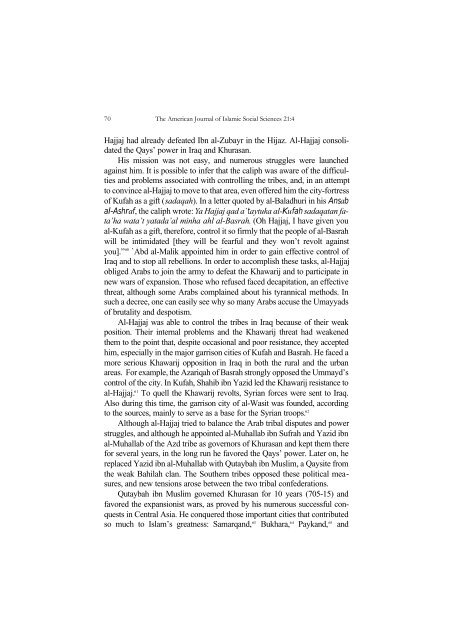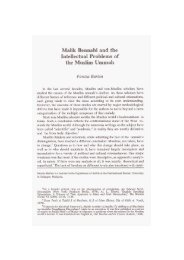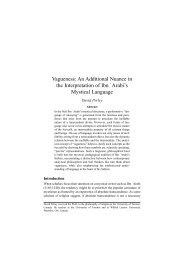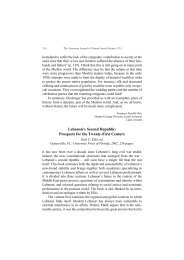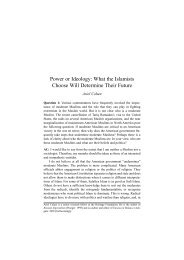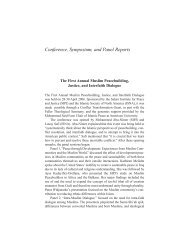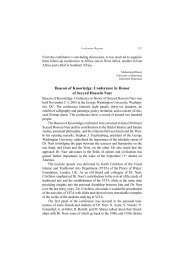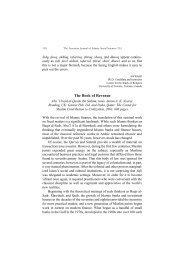Arab Tribes, the Umayyad Dynasty, and the `Abbasid ... - Epistemology
Arab Tribes, the Umayyad Dynasty, and the `Abbasid ... - Epistemology
Arab Tribes, the Umayyad Dynasty, and the `Abbasid ... - Epistemology
Create successful ePaper yourself
Turn your PDF publications into a flip-book with our unique Google optimized e-Paper software.
70 The American Journal of Islamic Social Sciences 21:4<br />
Hajjaj had already defeated Ibn al-Zubayr in <strong>the</strong> Hijaz. Al-Hajjaj consolidated<br />
<strong>the</strong> Qays’ power in Iraq <strong>and</strong> Khurasan.<br />
His mission was not easy, <strong>and</strong> numerous struggles were launched<br />
against him. It is possible to infer that <strong>the</strong> caliph was aware of <strong>the</strong> difficulties<br />
<strong>and</strong> problems associated with controlling <strong>the</strong> tribes, <strong>and</strong>, in an attempt<br />
to convince al-Hajjaj to move to that area, even offered him <strong>the</strong> city-fortress<br />
of Kufah as a gift (sadaqah). In a letter quoted by al-Baladhuri in his Ansab<br />
al-Ashraf, <strong>the</strong> caliph wrote: Ya Hajjaj qad a`taytuka al-Kufah sadaqatan fata’ha<br />
wata’t yatada’al minha ahl al-Basrah. (Oh Hajjaj, I have given you<br />
al-Kufah as a gift, <strong>the</strong>refore, control it so firmly that <strong>the</strong> people of al-Basrah<br />
will be intimidated [<strong>the</strong>y will be fearful <strong>and</strong> <strong>the</strong>y won’t revolt against<br />
you].” 60 `Abd al-Malik appointed him in order to gain effective control of<br />
Iraq <strong>and</strong> to stop all rebellions. In order to accomplish <strong>the</strong>se tasks, al-Hajjaj<br />
obliged <strong>Arab</strong>s to join <strong>the</strong> army to defeat <strong>the</strong> Khawarij <strong>and</strong> to participate in<br />
new wars of expansion. Those who refused faced decapitation, an effective<br />
threat, although some <strong>Arab</strong>s complained about his tyrannical methods. In<br />
such a decree, one can easily see why so many <strong>Arab</strong>s accuse <strong>the</strong> <strong>Umayyad</strong>s<br />
of brutality <strong>and</strong> despotism.<br />
Al-Hajjaj was able to control <strong>the</strong> tribes in Iraq because of <strong>the</strong>ir weak<br />
position. Their internal problems <strong>and</strong> <strong>the</strong> Khawarij threat had weakened<br />
<strong>the</strong>m to <strong>the</strong> point that, despite occasional <strong>and</strong> poor resistance, <strong>the</strong>y accepted<br />
him, especially in <strong>the</strong> major garrison cities of Kufah <strong>and</strong> Basrah. He faced a<br />
more serious Khawarij opposition in Iraq in both <strong>the</strong> rural <strong>and</strong> <strong>the</strong> urban<br />
areas. For example, <strong>the</strong> Azariqah of Basrah strongly opposed <strong>the</strong> Ummayd’s<br />
control of <strong>the</strong> city. In Kufah, Shahib ibn Yazid led <strong>the</strong> Khawarij resistance to<br />
al-Hajjaj. 61 To quell <strong>the</strong> Khawarij revolts, Syrian forces were sent to Iraq.<br />
Also during this time, <strong>the</strong> garrison city of al-Wasit was founded, according<br />
to <strong>the</strong> sources, mainly to serve as a base for <strong>the</strong> Syrian troops. 62<br />
Although al-Hajjaj tried to balance <strong>the</strong> <strong>Arab</strong> tribal disputes <strong>and</strong> power<br />
struggles, <strong>and</strong> although he appointed al-Muhallab ibn Sufrah <strong>and</strong> Yazid ibn<br />
al-Muhallab of <strong>the</strong> Azd tribe as governors of Khurasan <strong>and</strong> kept <strong>the</strong>m <strong>the</strong>re<br />
for several years, in <strong>the</strong> long run he favored <strong>the</strong> Qays’ power. Later on, he<br />
replaced Yazid ibn al-Muhallab with Qutaybah ibn Muslim, a Qaysite from<br />
<strong>the</strong> weak Bahilah clan. The Sou<strong>the</strong>rn tribes opposed <strong>the</strong>se political measures,<br />
<strong>and</strong> new tensions arose between <strong>the</strong> two tribal confederations.<br />
Qutaybah ibn Muslim governed Khurasan for 10 years (705-15) <strong>and</strong><br />
favored <strong>the</strong> expansionist wars, as proved by his numerous successful conquests<br />
in Central Asia. He conquered those important cities that contributed<br />
so much to Islam’s greatness: Samarq<strong>and</strong>, 63 Bukhara, 64 Payk<strong>and</strong>, 65 <strong>and</strong>


